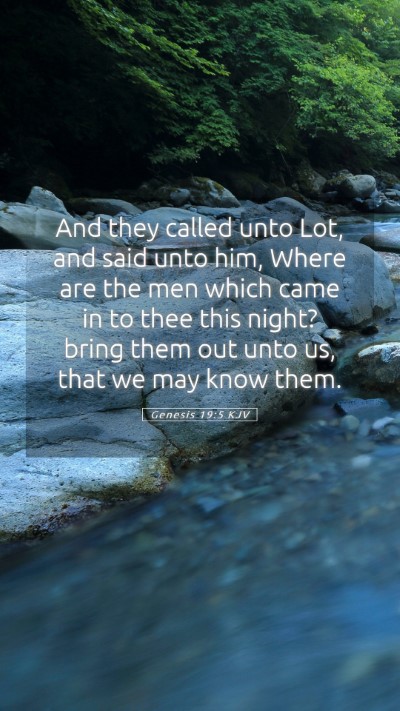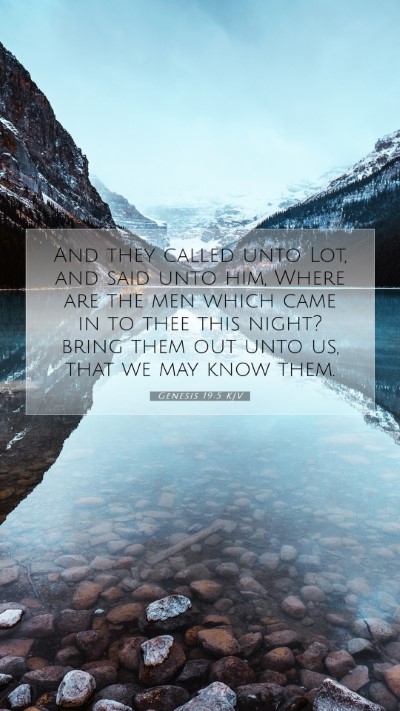Understanding Genesis 19:5 - Commentary and Interpretation
Genesis 19:5 states: "And they called unto Lot, and said unto him, Where are the men which came in to thee this night? bring them out unto us, that we may know them." This verse is set in the context of Sodom and Gomorrah, illustrating a dire moral condition in biblical history. The request made by the men of the city toward Lot's guests reflects deep violations of hospitality and the challenges posed by societal sinfulness.
Bible Verse Meaning
The fundamental meaning of this verse centers around the theme of wickedness and the impending judgment that Sodom will face. The term "know" in the biblical context often implies sexual relations, highlighting the perverse desires of the Sodomites. This moment in Scripture underscores the contrast between Lot's unwillingness to comply with the men’s desires and the sinful nature of the society around him.
Insights from Commentaries
-
Matthew Henry:
Matthew Henry emphasizes the moral decay prevalent in Sodom, noting that the men’s actions symbolize the extreme depravity that society can descend into when it disregards divine moral standards. He points to Lot’s protective instincts for his guests as a demonstration of righteousness in a corrupt locality, leading to significant discussions on the nature of hospitality in biblical culture.
-
Albert Barnes:
Albert Barnes offers an analysis of the term "know," explaining that it reflects not only a physical desire but a fundamental violation of the sanctity of human relationships and God’s design for intimacy within the covenant of marriage. His commentary stresses the urgency of Lot’s position, trapped between societal expectations and divine law.
-
Adam Clarke:
Adam Clarke examines the historical context of the passage, noting that Sodom's infamous reputation invites divine judgment. He highlights the theological implications of Lot’s situation as indicative of the struggle of the righteous within an unrighteous world, bringing to the forefront discussions about sin, judgment, and redemption.
Key Themes Explored in the Verse
- Moral Decay: The request made by the Sodomite men illustrates the depravity that characterized the cities of Sodom and Gomorrah.
- Judgment: This passage foreshadows the divine judgment that would soon befall these cities due to their wickedness.
- Hospitality and Righteousness: Lot's actions represent a stark contrast to the surrounding moral chaos, highlighting the importance of righteousness amidst evil.
- Divine Standards vs. Human Desires: The conflict in the verse represents the tension between God's moral laws and the destructive desires of humanity.
Bible Study Insights
When engaging in Bible study, Genesis 19:5 serves as an invaluable lesson in understanding the depths of human sinfulness and the basis for God's judgment. This passage can help facilitate discussions in bible study groups regarding the implications of morality in our lives today and how ancient teachings provide guidance for contemporary issues.
Related Bible Cross References
- Genesis 6:5 - "And God saw that the wickedness of man was great in the earth..."
- Leviticus 18:22 - "Thou shalt not lie with mankind, as with womankind: it is abomination."
- Romans 1:26-27 - "For this cause God gave them up unto vile affections..."
- Matthew 10:15 - "Verily I say unto you, It shall be more tolerable for the land of Sodom and Gomorrah in the day of judgment, than for that city."
- 2 Peter 2:6-8 - "And turning the cities of Sodom and Gomorrah into ashes condemned them with an overthrow..."
Final Thoughts
Genesis 19:5 is a profound reminder of not only the ancient history of moral turmoil but also an urgent call for reflection on the societal norms of our own time. By examining this verse through the lenses of multiple commentaries, it fosters a deeper understanding of Scripture and encourages Bible study insights that are essential for personal growth and community discussions.


